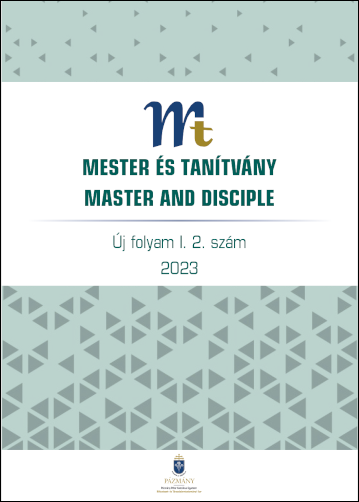Published 31-12-2023
Keywords
- evolutionary pedagogy,
- natural pedagogy,
- ostensive,
- education,
- teaching
Copyright (c) 2023 Kormos József

This work is licensed under a Creative Commons Attribution 4.0 International License.
Abstract
„Man is the only creature whose education is necessary.... Manan become man only through education. He is nothing other than what education makes him. Note that man can only be educated by men, by men who are also educated.” In connection with Kant's definition, one of the fundamental issues of pedagogy is the influence and significance of environmental factors and hereditary endowments. The influence of the environment is perhaps more direct, more researchable and more understandable. In the case of inherited traits, it is more difficult to explore the connections and explanations. This is especially difficult when we ask the question in general: What makes it possible for a human being to be teachable, educable and at the same time capable of teaching and educating? Is it something that man "learns" through the environment, or does man have inherited species-specific traits that make him capable of doing so? Current research (biology, psychology, cognitive sciences, etc.) tends to support the existence of inherited species-specific traits. In pedagogy, explanations of this kind come from natural pedagogy and the evolutionary pedagogy that follows from it.
In addition to a brief presentation of the evolutionary point of view of pedagogy, the study presents the following useful practical insights and theoretical difficulties and questions from this point of view.
References
- Bábosik István (2004). Neveléselmélet. Nevelés az Európai Unióban. Budapest, Osiris Kiadó.
- Bereczkei Tamás (2008). Evolúciós pszichológia. Budapest, Osiris Kiadó.
- Csibra Gergely, Gergely György Társas tanulás és a társas megismerés. A pedagógia szerepe. In Csibra Gergely, Gergely György (szerk.) (2007). Ember és kultúra. A kulturális tudás eredete és átadásának mechanizmusai. Budapest, Akadémiai Kiadó. 5-30.
- Kant, Immanuel (1983). Über Pädagogik. In Kant, Immanuel (1983). Schriften zur Anthropologie, Geschichtsphilosophie, Politik und Pädagogik. (Kant Werke Band 10.) Darmstadt, Wissenschaftliche Buchgesellschaft.
- Káplár Mátyás (2016). A nevelés evolúciója. 225-238. Gyuris Petra, Meskó Norbert (szerk.) 2016. Evolúciós pszichológia mesterfokon. Pécs, Pro Pannónia Kiadói Alapítvány.
- Kormos József (2019). Filozófiáról bölcsészeknek és tanároknak. Budapest, PPKE BTK.
- Nemes László (2003). Az evolúciós pszichológia helyes kezelésérő. In Világosság 2003. 3-4.
- Pléh Csaba (2010). Naturalizmus a pszichológiában? In Magyar Filozófiai Szemle. 2010/1. 79-86. https://www.epa.hu/00100/00186/00022/pdf/EPA00186_magyar_filozofiai_szemle_2010_1_079-086.pdf
- Pukánszky Béla, Németh András (1996). Neveléstörténet. Budapest, Nemzeti Tankönyvkiadó. https://magyar-irodalom.elte.hu/nevelestortenet/08.08.html )
- Scheunpflug, Annette (2002). Evolutionäre Pädagogik. Einführung in den Thementeil. In Zeitschrift für Pädagogik. 2002.5. 649-652.
- Soós István (2017). Evolúciós pszichológia. In N. Kollár Katalin, Szabó Éva (szerk.) (2017). Pedagógusok pszichológiai kézikönyve III. Budapest, Osiris Kiadó, 271-289.

